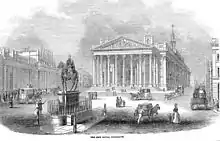1844 in the United Kingdom
Other years |
| 1843 | 1844 | 1845 | 1846 |
Sport |
Events from the year 1844 in the United Kingdom.
Incumbents
- Monarch – Victoria
- Prime Minister – Robert Peel (Conservative)
- Parliament – 14th
Events


The Royal Exchange (London), opened by Queen Victoria on 28 October
- 28 February – the Grand National at Aintree is won by the 5/1 joint favourite Discount.
- 11 April – initiation of the Ragged Schools Union.[1]
- 11 May – major fire at Lyme Regis.[2]
- 6 June – George Williams founds the Young Men's Christian Association (YMCA) in London.[3]
- 15 June – Factory Act imposes a maximum 12-hour working day for women, and a maximum 6-hour day for children aged 6 to 13.[4]
- 19 July – Bank Charter Act restricts powers of British banks other than the Bank of England to issue banknotes of the pound sterling.[5][6]
- 9 August – imprisonment for debt abolished in England.[7]
- 21 & 27 August – consecration of two new major urban Roman Catholic churches, both designed by Augustus Pugin, which will in the 1850s be elevated to cathedral status: St Mary's Church, Newcastle upon Tyne and St Barnabas Church, Nottingham. (In October, Pugin occupies The Grange, Ramsgate, a house designed for himself which is influential in the development of domestic Gothic Revival architecture.)[8]
- 28 September – a blackdamp explosion at Haswell Colliery in the Durham Coalfield kills 95, with just four survivors.[9]
- 8 October – Louis-Phillipe arrives in Portsmouth
- 20 October – Counties (Detached Parts) Act 1844 comes into effect, eliminating many outliers or exclaves of counties in England and Wales for civil purposes.
- 28 October – the Royal Exchange in London opened by Queen Victoria.[10]
- 21 December – the Rochdale Pioneers, usually considered the first successful cooperative enterprise, open their store in Rochdale, forming the basis for the modern cooperative movement.[3]
Undated
- Henry Hardinge, 1st Viscount Hardinge appointed as Governor-General of India.[11]
- Winsford rock salt mine opens in Cheshire; by 2014 it will be Britain's oldest working mine.[12]
- Ring of bells installed at St John the Evangelist's Church, Kirkham (Lancashire), said to be the first peal rung in an English Roman Catholic church since the Reformation.[13][14]
- "Surplice riots" in Exeter and London break out in opposition to supposed Catholicisation of the Church of England.
- King Frederick Augustus II of Saxony makes an informal summer tour of Britain.
Publications
- Robert Chambers' anonymous Vestiges of the Natural History of Creation, which paves the way for acceptance of Darwin's The Origin of Species.
- Charles Dickens' novel Martin Chuzzlewit (complete in book form) and his Christmas novella The Chimes.
- Benjamin Disraeli's novel Coningsby.
- Henry Fox Talbot's book The Pencil of Nature, the first illustrated with photographs from a camera (publication commences June).
- William Makepeace Thackeray's novel The Luck of Barry Lyndon (serialisation).
Births
- 3 May – Richard D'Oyly Carte, theatrical impresario (died 1901)
- 22 July – William Archibald Spooner, scholar and Anglican priest (died 1930)
- 28 July – Gerard Manley Hopkins, English poet (died 1889)
- 6 August – Alfred, Duke of Saxe-Coburg and Gotha, second son of Queen Victoria (died 1900)[15]
- 29 August – Edward Carpenter, socialist poet (died 1929)
- 23 October – Robert Bridges, English poet (died 1930)
- 25 October – Arthur William à Beckett, journalist (died 1909)
- 1 December – Alexandra of Denmark, queen of Edward VII (died 1925)
Deaths
- 23 January – Sir Francis Burdett, politician (born 1770)
- 15 February – Henry Addington, 1st Viscount Sidmouth, Prime Minister of the United Kingdom (born 1757)
- 3 April – Edward Bigge, Archdeacon of Lindisfarne (born 1807)
- 27 July – John Dalton, chemist and physicist (born 1766)
- 2 November – Augustus Wall Callcott, landscape painter (born 1779)
- 23 November – Thomas Henderson, astronomer (born 1798)
See also
References
- Berry, George (1970). Discovering Schools. Tring: Shire Publications. ISBN 0-85263-091-3.
- The Illustrated London News 18 May 1844.
- Penguin Pocket On This Day. Penguin Reference Library. 2006. ISBN 0-14-102715-0.
- Palmer, Alan; Veronica (1992). The Chronology of British History. London: Century Ltd. pp. 266–267. ISBN 0-7126-5616-2.
- "The Bank Charter Act 1844" (PDF). OPSI. Retrieved 19 October 2010.
- Bank of England. "A brief history of banknotes". Retrieved 8 October 2007.
- Munsell, Joel (1858). The Every Day Book of History and Chronology. D. Appleton & Co.
- Hill, Rosemary (2008). God's Architect: Pugin and the Building of Romantic Britain. London: Penguin Books. ISBN 978-0-140-28099-9.
- "Haswell – the 1844 Pit Disaster". A history of Haswell. Archived from the original on 15 August 2009. Retrieved 15 October 2010.
- "Royal Exchange History". Archived from the original on 14 August 2007. Retrieved 28 October 2007.
- Cates, William L. R. (1863). The Pocket Date Book. Chapman and Hall.
- "Welcome to Winsford Rock Salt Mine". Salt Union Ltd. Retrieved 29 July 2012.
- "St John the Evangelist, Kirkham". Taking Stock. Archived from the original on 2 June 2014. Retrieved 2 June 2014.
- "History". Parish of the Holy Cross. Retrieved 2 June 2014.
- Panton, James. Historical Dictionary of the British Monarchy. Scarecrow Press. p. 39. ISBN 978-0-8108-7497-8.
This article is issued from Wikipedia. The text is licensed under Creative Commons - Attribution - Sharealike. Additional terms may apply for the media files.